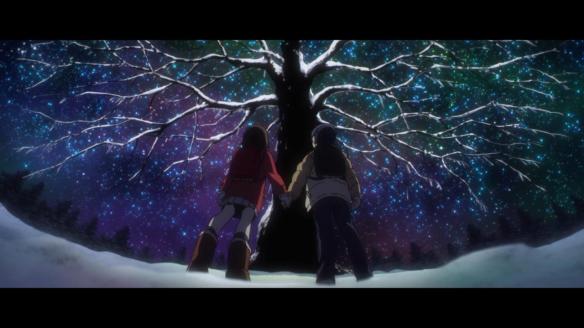
Part 3 of my countdown of the Winter 2016 season
3. Erased
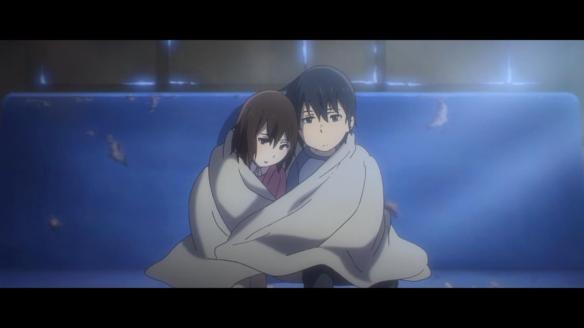
Back when the winter season first began I remember writing a rough impressions post on Erased, savaging it from art to story. However, then I started seeing positive responses from nearly every quarter and began to wonder if I’d either missed something or been so burned out by the sheer number of shows consumed that I couldn’t treat it fairly. From this I decided to defer judgement until the second episode had aired in an attempt to re-evaluate things.
In one regard it did, but not by changing my initial issues. I still found the character designs for the adults overly simplified compared to the heavy tone of the child serial killer plotline, while Satoru’s alienation and displacement in society was definitely relatable in concept but I could never buy into the idea that this was a grown man speaking as opposed to someone on the cusp of adulthood. However, the shift back to 1988’s child focused cast and domestic plot beats seemed a better fit for the heavy handed emotional reactions and awkwardness. There was still a complete lack of subtlety but coming from the clumsy, untrained mouths of kids it now felt appropriate.
This sense of fracturing between the two stories Erased wanted to tell never left me as they progressed to the extent I found it easier to pretend I was watching two separate shows.
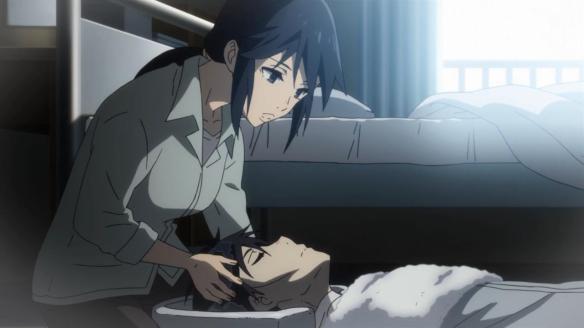
One of these is a heartfelt and surprisingly moving tale of bonding and unconditional love with those in desperate need of it, whether from Sataru’s attempt to save Kayo from her abusive and emotionally stunting home life or the quiet way his mother influences from the side-lines, serving as a solid yet hands-off support system that takes a lot of the pressure from Sataru without being direct enough to interfere with his decisions.
For me Sachiko serves the real heart of the show, being a fantastic depiction of a struggling single parent, who simply does her best on limited means without ever descending into fabricated supermom territory. Meanwhile the abuse plotline, when focused solely on the victim, is also expertly handled, showing the effects of trauma without falling into exploitation or shock tactics. The scene with Kayo looking incredulously at a family serving breakfast but also initially misunderstanding the playful fighting between mother and son reveals a child who has built up an incredible amount of strength to endure varying types of pain in silence, yet is utterly vulnerable to the simplest act of kindness. Considering this was directed by the person behind Sword Art Online, I was honestly shocked at how delicate the show could often be during the quieter moments, while retaining a blunt and honest mood. Even if the show isn’t particularly nuanced, it can depict small gestures in powerful ways.
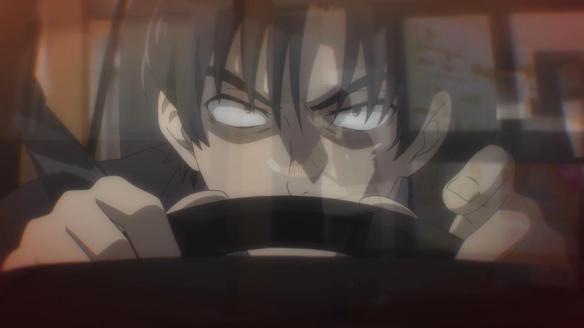
Unfortunately the other side of this show is the time-travelling murder mystery which reveals the flipside to how a lack of subtlety can do more harm than good when the ideas aren’t up to scratch. The moment Erased decides to throw in cliff-hanger plot twists and dramatic revelations, it starts to go off the rails, with nonsensical moustache twirling motivations and ass-pulls to move the story in unexpected directions. Here we see what happens when the author’s ideas start to run away from him, with cackling grins and backstories involving candy bar theft traumas and a hamster Battle Royales. There are nuggets of interesting ideas but they’re usually overblown to the point of irrelevancy. Tomohiko Itō’s directing is still effective in building up tension, with the music deserving particular credit during these moments (e.g. the Kayo hiding out in the bus at night), but his habit of exaggerating facial expressions during dramatic peaks turns the already hackneyed and contrived writing to almost comical degrees, mimicking the crazy-eyed villains from SAO all over again.
Then there’s the serial killer reveal, which was so obvious due to the lack of alternative candidates that as the show progressed I began to treating it as a red herring, theorising multiple perpetrator options and other increasingly leftfield alternatives. By the time reveal occurred, I’d come to the conclusion that while the author’s heart was in the right place he was rather inept at writing a decent thriller. The powerful moments always tended to come from the direction itself; the menacing close up on a knife peeling apples or the Satoshi Kon-esque way a scene might transition into another. The actual twists and turns in the script often caused more damage than good.
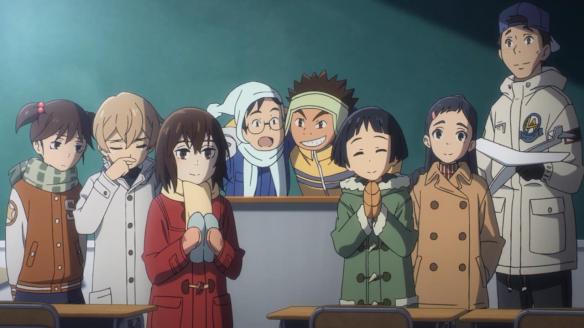
Ultimately I can’t help but look at Erased and feel the perpetrator storyline could have been removed entirely without damaging the core of the show (at the very least the flash-forward plot at the midway point could have been cut, with Airi’s role as a potential love interest feeling extraneous and unnecessary). As a tale about familial love and reaching out I couldn’t recommend Erased more, but as a crime drama it’s a schlocky & forgettable mess. That the two aspects usually manage to avoid interfering with one another ends up the shows’ saving grace.
